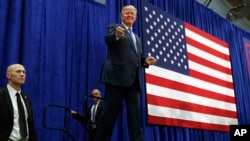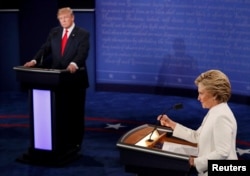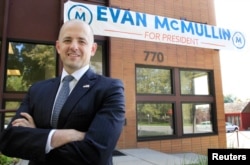Faced with disappointing polling numbers and less than three weeks to bridge the gap, Donald Trump on Friday nonetheless stayed upbeat as he campaigned in two key battleground states.
"I honestly believe we're going to win," the Republican presidential candidate told a rally in North Carolina before heading to the swing state of Pennsylvania.
Trump highlighted three recent polls showing him ahead of his rival, Democratic presidential candidate Hillary Clinton, who is campaigning Friday in the hotly contested state of Ohio.
But as the race enters its final phase, the reality is that Trump is playing catchup.
Clinton leads Trump by more than 6 points nationwide, according to several respected polling averages. She is coming off a strong performance in Wednesday's final debate of the campaign. She also has a significant cash advantage, according to figures released this week.
New states in play
Clinton's most important edge is evident when you look at the state-by-state electoral map. According to the FiveThirtyEight website, Clinton is forecast to win 341 electoral votes, compared to Trump's 196.
That is mostly due to Clinton's small but significant lead in the handful of traditional swing states, which typically decide a presidential election.
Most years, those states include Florida, Ohio, Pennsylvania, Iowa, New Hampshire and a few others. But this year, swing states are popping up everywhere.
Some recent polls have shown a shockingly tight race in longtime Republican strongholds such as Georgia, Arizona, Utah and even Texas.
It raises the question of whether Trump has a viable path toward winning the presidency.
"If he can't win Utah, he can't pull it off," said Reed Galen, a political consultant who worked on both successful campaigns of ex-President George W. Bush.
Utah has voted for a Republican president every election since 1968. But this year Trump faces a serious challenge there, not only from Clinton but also from independent candidate Evan McMullin.
Trump has just a one-point lead over McMullin and a five-point lead over Clinton according to the latest Utah poll, released Friday by UtahPolicy.com.
Mormons make up a large percentage of Utah, and are "singularly disgusted" at Trump's crass comments about women, Galen says. Many Utah residents may also find it attractive that McMullin is a member of the Mormon church.
Minorities, women skeptical
Trump has also struggled to win over several other crucial voting blocs, such as African Americans, Latinos, and suburban women — factors that help explain his standing in states like Georgia and Arizona.
So far there is little evidence to suggest Trump is changing his strategy to address his deficits in the new battleground states. Instead, he is focusing on traditional swing states.
Trump has also doubled down on his message to his far-right base, lashing out at more moderate Republicans who have rejected his candidacy and refusing to say whether he will accept the results of an election loss.
That pattern reflects Trump's inability to grow a sufficient base of support, says Gary Nordlinger, a professor at the Graduate School of Political Management of George Washington University.
"This could have been a very winnable campaign for him, but he would have had to stop saying and doing thoughtless things," Nordlinger said. "I have never seen a candidate with so many self-inflicted wounds."










